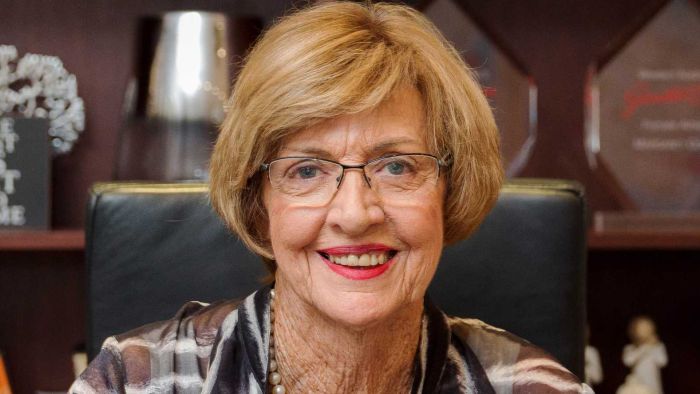Victorian Premier Daniel Andrews and WA Premier Mark McGowan say they do not support former tennis great Margaret Court being recognised with an Australia Day honour.
Key points:
- The tennis legend was the first Australian woman to win Wimbledon
- Ms Court, 78, is now a reverend and has been outspoken on social issues
- She was particularly opposed to same-sex marriage
Ms Court is set to be promoted to a Companion of the Order of Australia (AC) — she is currently an Officer of the Order of Australia (AO).
In recent years, Ms Court has come under fire for her views on the LGBT community.
“I do not support that. I do not believe that she has views that accord with the vast majority of people across our nation, that see people particularly from the LGBT community as equal and deserving as dignity, respect and safety,” Mr Andrews said.
Mr McGowan, from Ms Court’s home state, said he did not agree with Ms Court being given the additional honour.
“I don’t share Margaret Court’s views, in particular around gay and lesbian people,” he said.
“I think extra Order of Australia awards should go to unsung heroes across the country and there’s a great many of them.”
The Order of Australia has four levels, of which Ms Court’s new status as a “Companion” is highest.
Prime Minister Scott Morrison said there was an “independent process” to decide who was honoured and that it was “a system that recognises the full spectrum of individuals across this country”.
Ms Court holds a record 24 grand slam singles titles and was the first female Australian to win Wimbledon in 1963.
The 78-year-old, who is now a reverend in Perth, wrote an open letter in 2017 saying she would boycott Qantas over its support of same-sex marriage.
“I teach what the Bible says about things and you get persecuted for it,” she said in an ABC interview last year.
In 2013, Ms Court wrote a letter to the editor in a newspaper lamenting the birth of Australian tennis player Casey Dellacqua’s child in a same-sex relationship.
“It is with sadness that I see that this baby has seemingly been deprived of a father,” Ms Court wrote.




Her honour was supposed to be revealed next week, but news of the decision broke this morning.
Last year, Ms Court was presented with a special trophy to commemorate 50 years since she won all four tennis majors — the Australian Open, French Open, US Open and Wimbledon — in 1970.
The gong created a challenge for Tennis Australia, which distanced itself from her personal views.
She has also been a Member of the Order of the British Empire (MBE) since 1967, for her services to sport and international relations.
The International Tennis Hall of Famer’s 24 grand slams singles titles remain a record in the women’s game, although US legend Serena Williams has 23.
One of the main stadiums at Melbourne Park — home of the Australian Open — is named in her honour.




Mr Andrews said he would prefer not to be giving oxygen to Ms Court’s views.
“But I don’t give out those gongs, that’s not a matter for me, that’s for others,” he said.
“You might want to speak to them about why they think those views, which are disgraceful, hurtful and cost lives, should be honoured.”
His criticisms were echoed by Anna Brown, the chief executive of Equality Australia, who is also a member of the Order of Australia.
“From one recipient to another I hope that one day she sees Australia for the wonderful country that it is, and can be, when we recognise and value everyone who makes up our great nation equally,” Ms Brown said.
The Australian Christian Lobby says it supports the recognition of Ms Court in the Australia Day honours list.
In a statement, WA director Peter Abetz said: “If Australia Day Awards are only to be given to people who espouse politically correct views, it would destroy the very nature of these awards.”




After someone is nominated for the Order of Australia, staff in the Governor-General’s office research each candidate.
Once that is finished, the candidates are considered by the Council for the Order of Australia — an independent body of 19 members that has representation from each state and territory.
It’s not the first time the awards have caused controversy.
A decision to include men’s rights activist Bettina Arndt and journalist Mike Carlton in the Order of Australia last year were referred back to the Council in February.
However, the duo kept their gongs after a review.







